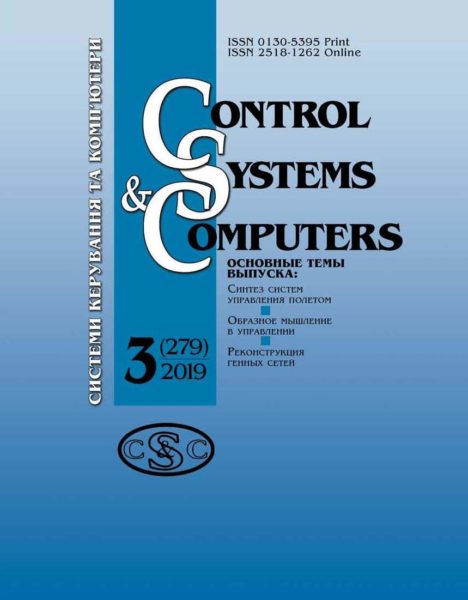Control Systems and Computers, N4, 2024, Article 8
https://doi.org/10.15407/csc.2024.04.068
Control Systems and Computers, 2024, Issue 4 (308), pp. 68-84.
UDC 519.85
Yu.H. TARASICH, PhD Inform. Technologies, V.M.Glushkov Institute of Cybernetics of the NAS of Ukraine, Glushkov ave., 40, Kyiv, 03187, Ukraine, ORCID: https://orcid.org/0000-0002-6201-4569, yutarasich@gmail.com
ALGEBRAIC MODELLING OF EXPERIMENTS ON THE EXAMPLE OF PROTON THERAPY
Introduction. Despite the rapid development of the chemical industry and science, discoveries in the field of health care, the emergence of drugs and therapeutics based on nanotechnology and the development of radiation therapy technologies, the safety of biomedical applications of the latest products, and the search for new methods and approaches to the diagnosis and treatment of cancer are an open issue. One of the safest and fastest methods for researching the behaviour of new materials and tools and selecting the best candidates is the modelling of relevant processes, particularly computer molecular modelling based on mathematical models. However, despite a large number of available methods and modelling tools, for most of them, the successful application is possible only for a narrow range of tasks and experiments.
As one of the possible solutions to this problem, we propose a new approach to computer molecular modelling based on the synergy of the algebraic approach, namely, algebraic modelling and biological knowledge at different levels of abstraction, starting from quantum interactions to interactions of biological systems.
We see one of the directions of application of this approach in the possibilities of modelling the radiation therapy process – starting from modelling the accelerators’ work and ending with modelling the interaction of the particles’ beam with the matter at the level of quantum interactions. In particular, in the article, we consider the possibilities of forward (specific and symbolic) and backward (symbolic) algebraic modelling on the example of models of the higher level of abstraction, which allows us to visualize certain interactions and to build charts of dependencies for specific models, and to determine the presence of the desired scenarios (forward modelling) or a set of initial environment parameters (backward modelling) in symbolic form.
Download full text! (On English)
Keywords: Molecular Modelling, Algebraic Modelling, Modelling of Biological Experiments, Proton Therapy Modelling, Theory of Agents and Environments Interaction, Symbolic Modelling.
- Dobbe, R., Tomlin, C. J. (2015) “Hybrid Systems Modeling for (Cancer) Systems Biology”. bioRxiv.) https://doi.org/10.1101/035022
- Lincoln, P., Tiwari, A. (2004) “Symbolic systems biology: Hybrid modeling and analysis of biological networks”. Hybrid Systems: Computation and Control: 7th International Workshop, HSCC 2004, Philadelphia, PA, USA, March 25-27. Proceedings 7 (Springer Berlin Heidelberg, 2004), pp. 660-672.
https://doi.org/10.1007/978-3-540-24743-2_44 - Abate, A., Hillen, R. C., Aljoscha, S. (2012) “Wahl Piecewise affine approximations of fluxes and enzyme kinetics from in vivo 13C labeling experiments”. International Journal of Robust and Nonlinear Control, 22(10), pp. 1120-1139.
https://doi.org/10.1002/rnc.2798 - Jones, B. (2017) “Clinical radiobiology of proton therapy: modeling of RBE”. Acta Oncologica, 56(11), pp.1374-1378.
https://doi.org/10.1080/0284186X.2017.1343496 - Chen, Y., Ahmad, S. (2011) “Empirical model estimation of relative biological effectiveness for proton beam therapy”. Radiation Protection Dosimetry, 149(2), pp.116-123.
https://doi.org/10.1093/rpd/ncr218 - Dahle, T. J., Rykkelid, A. M., Stokkevag, C. H., Mairani, A., Gorgen, A., Edin, N. J., Rorvik, E., Fjæra, L. F., Malinen, E., Ytre-Hauge, K. S. (2017) “Monte Carlo simulations of a low energy proton beamline for radiobiological experiments”. Acta oncologica (Stockholm, Sweden), 56(6), pp.779-786.
https://doi.org/10.1080/0284186X.2017.1289239 - Bitencourt-Ferreira, G., Pintro, V., de Azevedo, W. (2019) “Docking with AutoDock4”. Methods in Molecular Biology, pp.125-148.
https://doi.org/10.1007/978-1-4939-9752-7_9 - Hughes-Oliver, J.M., Brooks, A.D., Welch, W.J., Khaledi, M.G., Hawkins, D., Young, S.S., Patil, K, Howell, G.W., Ng, R.T., Chu, M.T. (2012) “ChemModLab: a web-based cheminformatics modeling laboratory”. In Silico Biol, 11(1-2), pp. 61-81.
- Morency, L., Gaudreault, F. and Najmanovich, R. (2018) “Applications of the NRGsuite and the Molecular Docking Software FlexAID in Computational Drug Discovery and Design”. Methods in Molecular Biology, pp. 367-388.
https://doi.org/10.1007/978-1-4939-7756-7_18 - Pirhadi, S., Sunseri, J., Koes, D. (2016) “Open source molecular modeling”. Journal of Molecular Graphics and Modelling, 69, pp. 127-143.
https://doi.org/10.1016/j.jmgm.2016.07.008 - Liu, K., Sun, X., Jia, L., Ma, J., Xing, H., Wu, J., Gao, H., Sun, Y., Boulnois, F., Fan, J. (2019) “Chemi-Net: A Molecular Graph Convolutional Network for Accurate Drug Property Prediction”. Int. J. Mol. Sci., 20, 3389.
https://doi.org/10.3390/ijms20143389 - Mathpal, D., Masand, M., Thomas, A., Ahmad, I., Saeed, M., Zaman, G.S., Kamal, M., Jawaid, T., Sharma, P.K., Gupta, M.M., Kumar, S., Srivastava, S.P., Balaramnavar, V.M. (2021) “Pharmacophore modeling, docking and the integrated use of a ligand- and structure-based virtual screening approach for novel DNA gyrase inhibitors: synthetic and biological evaluation studies”. RSC Advances. Vol. 11(55), pp. 34462-34478.
https://doi.org/10.1039/D1RA05630A - Lin, X., Li, X., Lin, X. (2020) “A Review on Applications of Computational Methods in Drug Screening and Design”. Molecules, vol. 25(6):1375.
https://doi.org/10.3390/molecules25061375 - Beentjes, C.H.L., Baker, R.E. (2019) “Quasi-Monte Carlo Methods Applied to Tau-Leaping in Stochastic Biological Systems”. Bull Math Biol, vol. 81, pp. 2931-2959.
https://doi.org/10.1007/s11538-018-0442-2 - Letichevsky, A., Gilbert, D. (1999) “A Model for Interaction of Agents and Environments”. In: Bert D., Choppy C., Mosses P.D. (eds) Recent Trends in Algebraic Development Techniques., WADT 1999, LNCS, vol. 1827, pp. 311-328.
https://doi.org/10.1007/978-3-540-44616-3_18 - Letichevsky, A.A., Godlevsky, A.B., Letychevsky, A.A., Potiyenko, S.V., Peschanenko, V.S. (2010) “Properties of a predicate transformer of the VRS system”. Cybernetics and Systems Analysis, 46, pp. 521-532.
https://doi.org/10.1007/s10559-010-9229-7 - Model Creator Tool [online]. Available at: <https://rd.litsoft.com.ua/> [Accessed 06 Oct. 2024].
- Letichevsky, A., Letychevskyi, O., Peschanenko, V. (2016) “Insertion modeling and its applications”. Computer Science Journal of Moldova, 72(3), pp. 357-370.
- Apsystem.org.ua. 2022. APS & IMS [online]. Available at: <http://apsystem.org.ua/> [Accessed 06 Oct. 2024].
Received 30.10.2024



